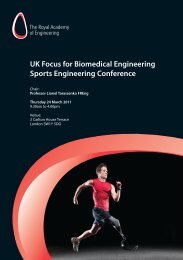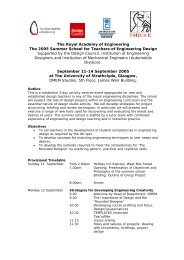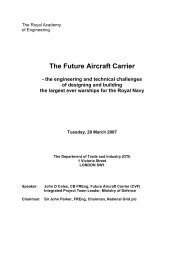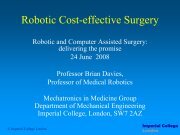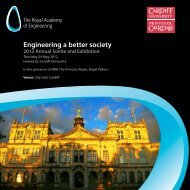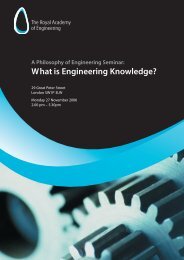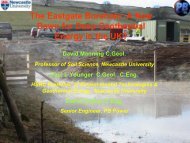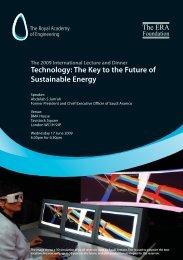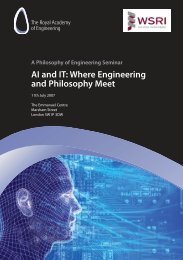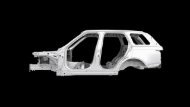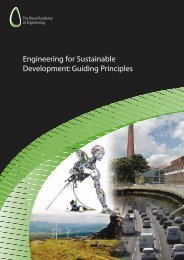Engineering graduates for industry - Royal Academy of Engineering
Engineering graduates for industry - Royal Academy of Engineering
Engineering graduates for industry - Royal Academy of Engineering
Create successful ePaper yourself
Turn your PDF publications into a flip-book with our unique Google optimized e-Paper software.
<strong>Engineering</strong> <strong>graduates</strong> <strong>for</strong> <strong>industry</strong><br />
Staff who may have limited experience <strong>of</strong> proposed new pedagogies need properly resourced (both time and money)<br />
opportunities <strong>for</strong> staff development, including the sharing and transfer <strong>of</strong> effective practice between engineering<br />
departments. Examples from the case studies include dedicated discipline-support units or teams, internal international<br />
fact-finding missions to bring in ideas and <strong>for</strong>m links with other practitioners (both in the UK and internationally),<br />
involvement with the CDIO international network and the use <strong>of</strong> external organisations such as the <strong>Engineering</strong> Subject<br />
Centre.<br />
The RAEng Visiting Pr<strong>of</strong>essors’ Scheme increases capability as well as capacity. The pr<strong>of</strong>essors are amongst the UK’s most<br />
senior and experienced engineers, possibly recently retired, and the success <strong>of</strong> this scheme is highlighted within the case<br />
studies. The scheme does not necessarily provide direct engagement with <strong>industry</strong>; the focus is on interaction on a oneto-one<br />
basis between department and visiting pr<strong>of</strong>essor.<br />
The Liverpool case study describes three RAEng Visiting Pr<strong>of</strong>essors with quite different roles – the first has revitalised<br />
the industrial liaison committee and has a role to engage <strong>industry</strong> at a senior level; the second has helped to integrate<br />
innovation input into modules and the third brings relevance from developing industries (nuclear engineering) into<br />
final year projects.<br />
Industrial experience <strong>of</strong> academic staff<br />
It is widely recognised throughout the case studies that academics with industrial experience help to create, implement<br />
and sustain experience-led engineering degrees. However, several incentives in the current funding models <strong>of</strong><br />
universities act against this. For example, research-led universities tend to favour staff with pr<strong>of</strong>iles likely to be highly<br />
rated in the research assessment exercise 78 .<br />
The situation at UK universities is in contrast to German universities <strong>of</strong> applied science, where staff are usually only<br />
recruited if they can demonstrate at least five years’ practical experience in <strong>industry</strong> 79 .<br />
Staff without prior experience <strong>of</strong> <strong>industry</strong> when they join a university can gain insight through <strong>for</strong>mal schemes such as<br />
the RAEng Industrial Secondment Scheme or in<strong>for</strong>mally through collaborative research or their involvement in<br />
experience-led teaching components such as placement visits and group design projects.<br />
6.6. Implementing change<br />
The ability to change is heavily dependent on senior management support and can be either incremental or radical:<br />
management leads change.<br />
The case study universities have implemented either incremental or radical changes to enhance their engineering<br />
degrees, depending on institutional ethos with regard to <strong>industry</strong>. Radical change is <strong>of</strong>ten triggered when a department<br />
or faculty has ‘stood still’ <strong>for</strong> a while. Incremental change tends to be part <strong>of</strong> an ongoing process in cases where a<br />
continuous response to <strong>industry</strong> engagement is embedded into institutional ethos. Sometimes, however, ongoing<br />
incremental change becomes insufficient and more wide-scale change is planned.<br />
“If single modules are addressed and ‘tweaked’ then these may well engender enthusiasm among the students but there is the<br />
likelihood that this could divert interest away from aspects <strong>of</strong> the programme that may have remained unchanged because<br />
they were considered crucial”. (Richard Simons, Pr<strong>of</strong>essor <strong>of</strong> Fluid Mechanics and Coastal <strong>Engineering</strong>, University College<br />
London)<br />
Radical change can bring large scale benefits, such as coherence across programmes, opportunities <strong>for</strong> efficiency gains<br />
and good use <strong>of</strong> capital spend. Incremental change can mean a faster response to changing needs, keeping ahead <strong>of</strong><br />
the game and taking advantage <strong>of</strong> opportunities as they arise (‘managed serendipity’). These different types <strong>of</strong> change<br />
result in hugely different costs, levels <strong>of</strong> risk, timescales and staff development needs. The more radical the change, the<br />
harder it can be to bring staff along with that change. Both types <strong>of</strong> change depend heavily on the support <strong>of</strong> senior<br />
management.<br />
78<br />
The research assessment exercise will be replaced by the Research Excellence Framework (REF) in 2013.<br />
79<br />
Maillardet, F. 2007, "The German experience <strong>of</strong> Academe-Industry links", Engage Project,<br />
www.engsc.ac.uk/engage/<br />
The <strong>Royal</strong> <strong>Academy</strong> <strong>of</strong> <strong>Engineering</strong> 47





